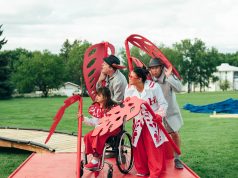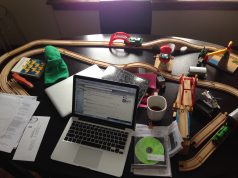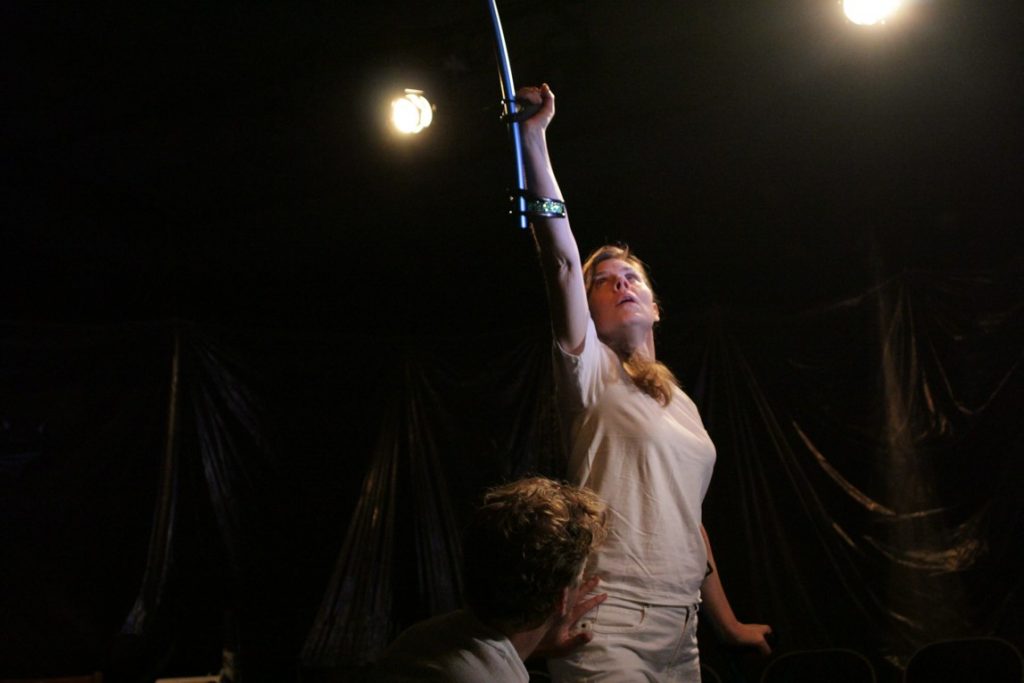
In 1999 I was diagnosed with multiple sclerosis. I knew a couple of people who had it and who showed no outward signs of the disease, so I was pretty optimistic that I would be the same. I wasn’t.
Like most actors, I enjoy physical challenges; I had danced the tango with Mack the Knife and swung a broad sword at the King of Scotland. But I stopped auditioning for plays when I could no longer walk without an obvious limp. All my training, all my experience told me that as an actor, I needed to be in peak physical condition. If I couldn’t be, I had to stop performing.
Having made my living in the business for 20 years, not only was it hard to imagine entering some other profession, it was devastating to think that all the other skills I had worked so hard to develop were now useless to me. How could I continue to do this work while remaining comfortably seated? So my first strategy was: to find a way to ignore it.
I began to develop as a playwright, which was great, but I missed having that direct relationship with an audience. I missed the intimacy of that shared experience. But because I was now a playwright, I could write plays that would allow me to hide my disability. This was my second strategy: finding ways to work around my disability.
I began working with Iris Turcott on a play I had been writing about a neighbourhood in decline, called Sargent & Victor. It was a one-person show I intended to perform myself: seated in a chair, with no movement or blocking so that no one would ever know I couldn’t walk. On the phone Iris asked me, “What’s wrong with you?” I told her a little bit about what was happening with my body and she said that that’s what I should be writing about. “What’s happening to your body is the same thing that’s happening in that neighbourhood, Dumbdumb.”
At first I resisted; I didn’t want to write a play about “me and my disease”. What could be more boring? But I learned that resistance is futile when you’re working with Iris Turcott. With a “here goes nothing” attitude, I began writing Sargent & Victor & Me. As is always the case, by being specific and digging deep, the work became profoundly universal. It was produced by Theatre Projects Manitoba to record-breaking attendance — and standing ovations.
Thanks to Iris, I finally landed upon my third and most successful strategy: to move towards my disability, to fully incorporate it into the work I was doing.
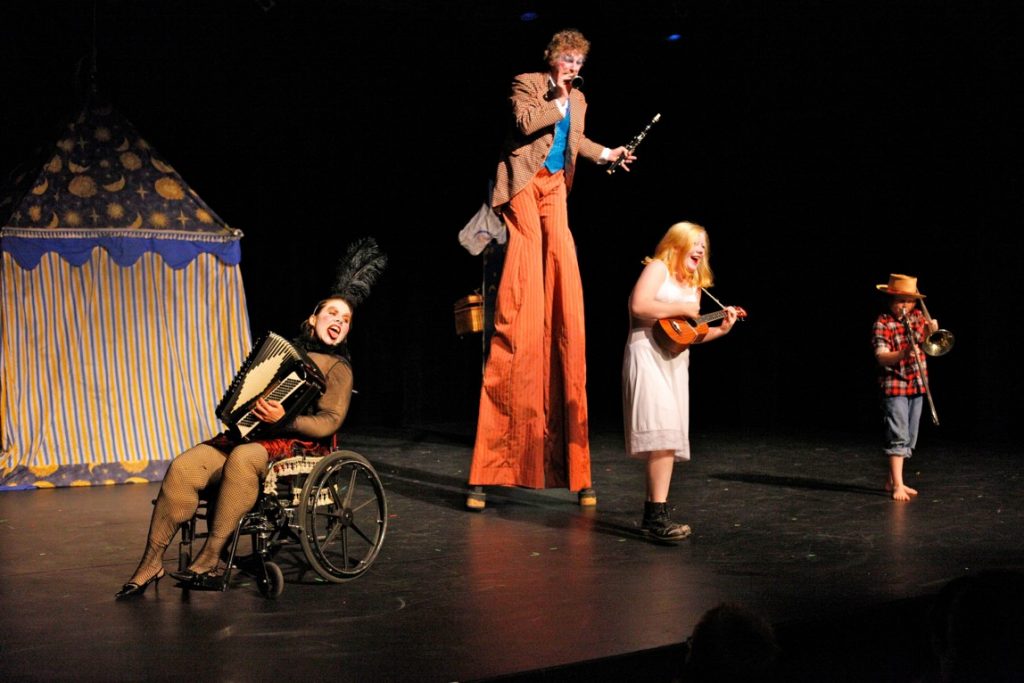
I realize that much of my resistance to doing this work was based on my own internalized ableism. While it’s obvious a person’s worth shouldn’t be contingent on their gender or their race, I hadn’t wrapped my brain around the idea that a person’s worth isn’t defined by their abilities. You can’t say men are superior to women, but it takes a little more work to recognize that a person who can walk is no better than a person who can’t walk.
When a person loses a sense, like sight or hearing, other senses become more acute. I’ve discovered that living with MS is no different.
My muscles don’t automatically do what I want them to do. When I move, I’ve become extremely mindful of what my body is doing. I am far more attuned to my movement now than I ever was before, despite all of the physical training I was given at theatre school.
Every day I do things that are dangerous: climbing stairs, handling things that could cut me or burn me. The clumsiness associated with MS makes all of these things potentially fatal. The risk now involved in completing the daily tasks of my life has made me more willing to take risks in my work.
In my daily life I come up against problems that I have to solve, stupid simple things like getting in and out of a vehicle, or navigating an opening night reception while juggling two crutches and a cocktail. These stupid little problems force me to think laterally, to find new ways to do ordinary things. This need to adapt, to use my imagination in very directed ways to solve problems has filtered into my work.
These three qualities — mindfulness, risk taking, and adaptive problem solving — have made me a better artist. As a performer, I’ve discovered my superpower is the way I move, which automatically brings with it something I call the “Cirque du Soleil effect”. When I walk across the room everyone is on the edge of their seat, wondering “is she going to fall?” No need to rig up the trapeze, I bring the danger.
There are two narratives that we attach to disability in popular culture: the cautionary tale (Don’t drink and drive or you’ll end up in a wheelchair and your life will be over!) and inspiration porn (She’s disabled, but she still has a job and raises children. What a hero!). But the truth is somewhere in between these two extremes of tragic or prosaic. And most tellingly, both of these narratives are directed at an “abled” audience.
Having a disability gives me the opportunity to tell the truths that no one seems to be telling. It gives me a window into an aspect of the human condition that, though it is universal, is seldom reflected in the stories we tell.
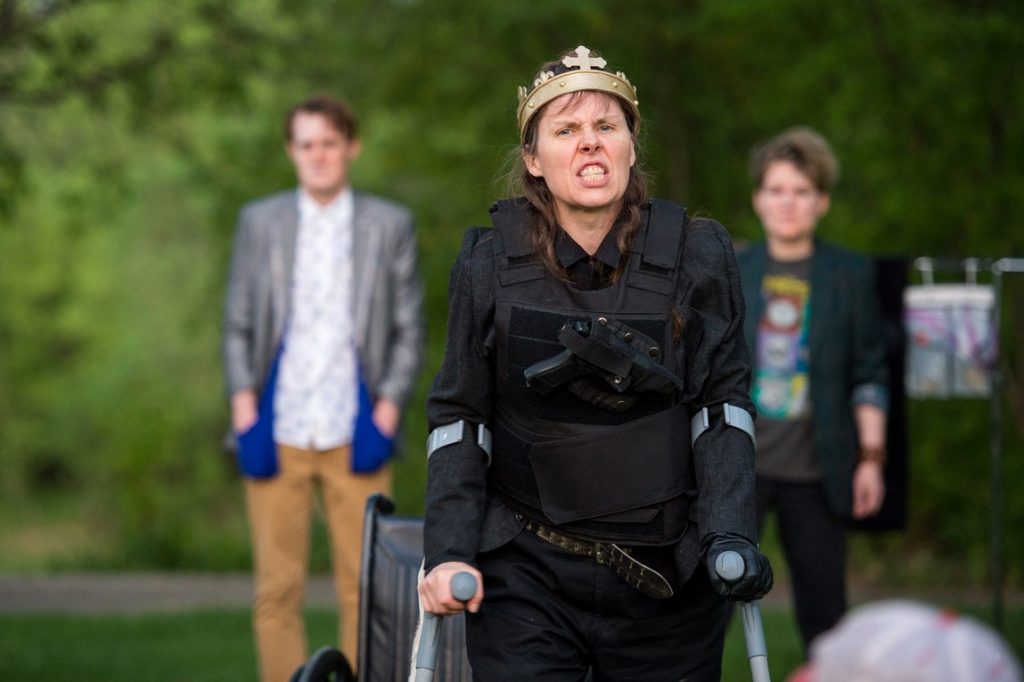
Disability is scary. We’ve all had the dream where we’re trying to run away from the monster and we just keep falling down. Now, here I am, living the dream. I’m forced to deal with something that most of us are afraid to even look at. As an artist, this is an amazing opportunity, to travel into the abyss and bring back the treasures I find there. I feel incredibly lucky to have the opportunity to do the work I do, at this time when representation of disability is beginning to be seen as an area of great potential.
But on the other hand, as a person with a disability I feel incredibly lucky to be an artist, to have a way of dealing with these changes that is fruitful and rewarding. MS is so capricious and unpredictable that if I hadn’t already learned, through my practice, how to be comfortable moving forward from a place of not knowing, how to embrace difficult truths, and, most importantly, how to fail, I would have a much harder time of it.
In clown, we talk about fuck-ups as gifts: the prop that falls apart, the door that doesn’t stay shut, the floor that squeaks when you’re trying to be sneaky. All of these things are gifts from the gods that we must accept and incorporate into what were doing. If we ignore them, we deny the truth. If we embrace, them we are rewarded.
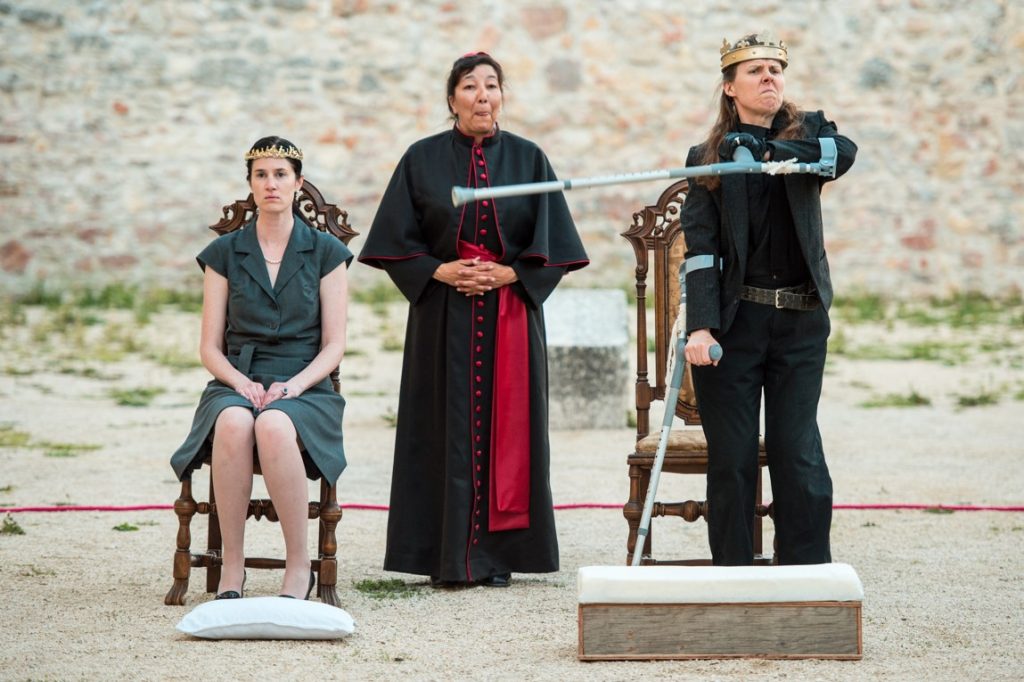
Last spring I was richly rewarded with the chance to play Richard III — the first time in Canada that a disabled actor had been cast in that role in a professional production. Imagine being the first female Juliet, the first black Othello. What an amazing opportunity!
Who knew? I thought disability would be the end of my work as an artist. I tried to run away from it, I tried to ignore it, I tried to deny it. But by embracing it, it has become the gift that has propelled me into a deeper, freer, more embodied practice.







